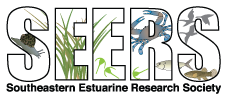Student Members
SEERS is committed to increasing opportunities for undergraduate and graduate students. The research conducted by our Student Members promotes the sharing of knowledge on estuarine science, education, and management.
SEERS conferences are supportive environments for students to present their research in either a poster or oral format with the opportunity to be given feedback from the estuary community and awards for best presentations.
To support our Student Members, we provide a number of opportunities for funding to SEERS and CERF conferences, network-building breakfasts with estuary experts at meetings, peer student mentorship through the SEA Buddy program, and opportunities to highlight your research on SEERS media platforms through the Student Spotlight. We regularly highlight post submissions from students on our social media pages, too: simply email the Student Representative your post.
Please contact the SEERS Student Representative with any questions you might have about joining SEERS.
Presentation Tips
Many online resources exist to aid students in oral and poster presentations, including poster templates and advice on oral presentation communication. Your school may also have resources to aid you in developing your presentation. SEERS prioritizes creating an encouraging environment for our students to gain experience in presenting.
Estuary Science Resources
One asset of being part of SEERS is that it is an affiliate society of the Coastal and Estuarine Research Federation (CERF). CERF regularly publishes peer-reviewed estuary science in its science journal, Estuaries and Coasts. The EPA National Estuary Program and NOAA National Estuarine Research Reserves provide a wealth of educational information and research data. Students may find Coastal Wiki helpful in developing a general understanding on coastal issues and processes.
Funding Opportunities
Numerous undergraduate and graduate scholarships and research grants exist nationally, regionally, and locally. Be sure to always check with your university to find internal funding that may be available in the form of scholarships, research funding, and travel grants. The following is a short list of sources that student members have applied to.
- AAAS Fellowships
- CUAHSI Universities Allied for Water Research
- DOD SMART Scholarship-for-Service Program
- Dr. Nancy Foster Scholarship Program
- Margaret A. Davidson Graduate Fellowship
- National Defense Science and Engineering Graduate (NDSEG) Fellowships
- NOAA Coastal Management Fellowship
- NSF Graduate Research Fellowship Program (GRFP)
- NSF Research Traineeship (NRT) Program
- Sea Grant (NC, SC, GA, FL, PR, National)
- Sigma Xi: Grants in Aid Research Program
- Smithsonian Internships and Fellowships
- Southeast Coastal Ocean Observing Regional Association
- UF Water Institute Graduate Fellowship
Graduate Programs in the SEERS Region
North Carolina
- Duke University: Division of Earth and Ocean Sciences, Durham, NC
- North Carolina State University: Department of Marine, Earth and Atmospheric Sciences, Raleigh, NC
- University of North Carolina at Chapel Hill: Department of Marine Sciences
- University of North Carolina at Wilmington: Center for Marine Science, Environmental Studies (new Dual MS in Env. Studies & Master of Public Admin.!)
South Carolina
- Coastal Carolina University: Department of Marine Science, Conway, SC
- University of Charleston: Marine Biology Program, Charleston, SC
- University of South Carolina: Marine Science Program, Columbia, SC
Georgia
- Georgia Institute of Technology: School of Earth & Atmospheric Sciences, Atlanta, GA
- Savannah State University: Marine Science Program, Savannah, GA
- University of Georgia: Department of Marine Sciences, Athens, GA
Florida
- Florida Atlantic University: Graduate Degrees in Marine Studies, Boca Raton, FL and Harbor Branch, Fort Pierce, FL
- Florida Institute of Technology: Programs in Marine Biology / Oceanography, Melbourne, FL
- Florida State University: Programs in Marine Biology & Oceanography, Tallahassee, FL
- Jacksonville University: Marine Science Graduate Program, Jacksonville, FL
- Nova Southeastern University: Programs in Marine Biology & Oceanography, Fort Lauderdale, FL
- University of Central Florida, Orlando, FL
- University of Florida: Program of Fisheries and Aquatic Sciences, Gainesville, FL
- University of Miami: Rosenstiel School of Marine & Atmospheric Science, Miami, FL
- University of North Florida: Coastal Biology Program, Jacksonville, FL
- University of South Florida: College of Marine Science, St. Petersburg, FL

